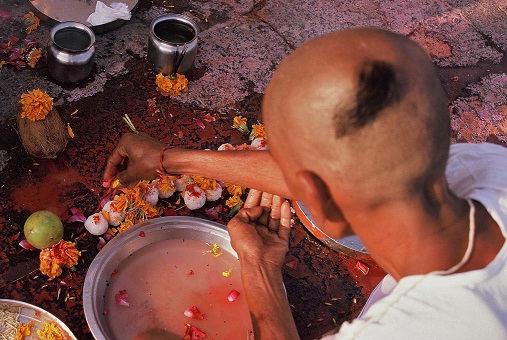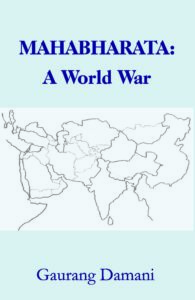
Pitru-s, our departed ancestors, both on the maternal and paternal sides are pleased when we offer them pinda daana. Heaven is for a person who has discharged all his debts towards his pitru-s including having an offspring to continue their lineage. When we show our gratitude towards the pitru-s, they bestow material benefits like prosperity, energy, and longevity on the performer. There are many events of shraadha in the epic Mahabharata showing continuity of tradition till date.
Hastinapura royals Pandu and Maadri lost their lives in the forest due to a sage’s curse. Pandu’s elder wife Kunti and the 5 Princes brought their bodies back to Hastinapura. The blind king Dhritarashtra asked the Prime Minister Vidura to make the funeral arrangements, after which their shraadha was performed.
The eldest Kaurava Prince Duryodhana experienced a lot of jealousy against his Pandava cousins. He conspired with his younger brother Dushasana, his uncle Shakuni, and friend Karna to burn them alive in a lakshya-griha (house of wax). Kunti and the 5 Pandava-s managed to escape into the forest with the help of Vidura.
As per Kunti’s wishes, Yudhishthira performed shraadha for Pandu at Maneshwar Mahadev mandir in Champawat in Uttarakhand state.
The Pandava-s not only survived but also won the hand of Panchala Princess Draupadi in her swayamvara. The elders in Hastinapura decided to split the kingdom, with the Pandava-s getting Indraprastha. They grew powerful and wealthy within a short time, again arousing jealousy in Duryodhana. He conspired with Shakuni and trapped Yudhishthira to gamble away his kingdom, brothers, and wife. After Dushasana tried to disrobe Draupadi, a furious Bhima swore to drink the blood from Dushasana’s chest, failing which he should not get entry into pitru-loka. Further, when Duryodhana beckoned Draupadi to sit on his left thigh in the assembly, Bhima swore that he will break that very thigh, or else he should not get entry into pitru-loka.
During their exile, the Pandava-s undertook a difficult teertha yatra with sages like Dhaumya and Lomasha. They went east and performed shraadha rituals at Gaya as suggested in the Vedic scriptures. The royal group reached the northern banks of the holy River Vaitarni in Kalinga and made offerings to their pitru-s. Here, as God Shiva had performed a yagnya rite in ancient times, the sages also conducted a ritual for Yudhishthira’s victory.
Even today, pitru pooja is done at Biraja Mata mandir on the banks of River Baitarni in Jajpur district of Odisha state. Devi Durga’s idol here is killing Mahishasura who is depicted as a buffalo. This Shakti peeth is also called Nabhigaya.
The group then proceeded further where they met and worshipped God Parashuraama at Mahendra Hills. After an extensive pilgrimage, they settled down at Kurukshetra. At that time, Rishi Markandeya and Devarishi Naarada reached there too.
One of Rishi Markandeya’s abodes was the Markandeshwar Mahadev mandir on the banks of River Markanda in Teokar in the Kurukshetra region of Haryana.
Markandeya said that a person who desires Dharma and heaven should always respect Brahmana-s. An able Brahmana is a person who does yagnya, mantra-japa, and Vedic abhyasa, thus constructing a boat to rescue himself and others. During shraadha too, a Brahmana should be well-fed and given gifts.
Later during Yudhishthira and Yamaraja’s conversation, it was shared that a wealthy person not doing charity, or a person insulting the Veda-s, Brahmana-s, Deva-s, and the pitru rituals, will go to Naraka (hell).
After the 13 years of exile were over, Yudhishthira demanded his kingdom back as per the agreed terms, but Duryodhana refused. The wise Vidura advised a worried Dhritarashtra to return the kingdom to the virtuous Yudhishthira who was always obedient to his command. But as always, Dhritarashtra could not and did not convince Duryodhana.
The deadly Mahabharata war ensued where all the Kaurava-s and their allies were killed. There were only a handful survivors on both sides. Thousands of kings, princes, and others killed were cremated. The Pandava-s stayed on the banks of River Ganga for a month to conduct the prescribed shraadha rituals for the departed souls.
As per the folklore of Uttar Pradesh, Pandava-s conducted the last rites on the banks of River Ganga in Garh Mukteshwar in Hapur. Even today, people immerse the ashes of their departed here.
Since so many of his relatives were dead in the war, a guilt-ridden Yudhishthira declared he will retire to the woods to atone for his sins. Rishi Vyaasa reminded Yudhishthira of his duties as a king. He advised him to be first free of his obligations towards the Deva-s and his pitru-s (forefathers) before contemplating sannyaasa. A reluctant Yudhishthira then decided to become the king.
Meanwhile, Bheeshma willingly gave up his life at the opportune time of uttarayana, after spending 58 nights on the bed of arrows. Yudhishthira completed his last rites with great respect on the banks of River Ganga. Dhritarashtra consoled Yudhishthira who was still suffering from mental agony. God Krishna explained that our pitru-s are hurt when we engage in excessive grief for them. He advised offering pinda daana for the departed and giving gifts to Brahmana-s.
According to local legends of Haryana state, the Pandava-s offered pinda daana in Pandu Pindara village and Hansdehar, both in Jind district. As per Rukmini’s suggestion, the Pandava-s also performed pinda daana at Pindtarak in Pindara village near Dwaraka in Gujarat state.
After spending 15 years in luxury, Dhritarashtra and Gandhari decided to take Vaanaprastha-ashrama and spend the rest of their lives in the woods. Before leaving, Dhritarashtra again performed shraadha rituals for his departed sons. He wanted to give gifts to people of all 4 varna-s who would come to meet him. Whatever endowment he decided, Yudhishthira multiplied it 10 times. Dhritarashtra stopped gifting after 10 days when he got tired of the distribution, and left for the forest. 2 years later Naarada visited Hastinapura and informed that Dhritarashtra, Gandhari, and Kunti got burnt in a forest fire near Gangadwara (present-day Haridwar in Uttarakhand state). The 5 brothers wept like small children, and then performed their shraadha rituals giving away a lot of daana (charity) in their name.
36 years after the war, Gandhari’s curse began to manifest and the Yadava noblemen fought and finished off each other. Krishna sent his charioteer Daaruka to Hastinapura to update the Pandava-s about the horrific events and that Dwaraka was soon going to be submerged under the sea. With him, Arjuna rushed to Dwaraka and gave the citizens 7 days to collect their valuables. Arjuna proceeded to Somanatha to perform the last crematory and shraadha rituals of the perished Yadava-s. On the 7th day, Arjuna escorted the surviving women, children, elders, other citizens, and soldiers out of Dwaraka, only to see the ocean flood the exquisite city.
Arjuna reached Hastinapura and updated his family members. The Pandava-s decided to follow the advice of Rishi Vyaasa and take Vaanaprastha-ashrama. Yudhishthira performed the shraadha rituals for the deceased Yadava-s. He then fed Rishi-s Vyaasa, Naarada, Markandeya, and Yaagnyavalkya. He gave a lot of wealth as daana (gifts) to Brahmana-s. Yudhishthira handed over the throne to Arjuna’s grandson Parikshita. The 5 brothers and Draupadi replaced their royal robes with those made from a tree’s bark and left Hastinapura. The flooding of Dwaraka and this departure heralded the advent of Kaliyuga in the year 3101 BCE. But the shraadha rituals have not changed in the past 5,126 years since.
This article is an excerpt from the book ‘Mahabharata: A World War’ by Gaurang Damani. The book is available at Padhega India and other online stores.
This article first appeared on the Hindu Post website.

